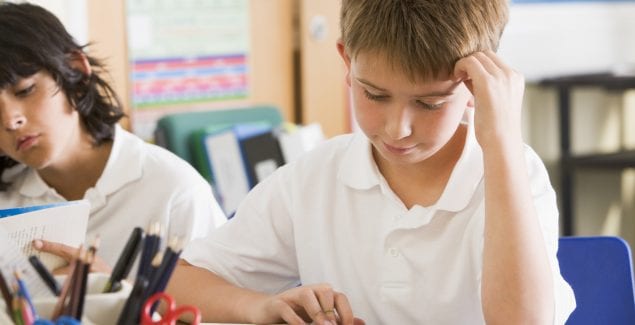What is Working Memory?

Posted in: Grade School, Parenting Concerns, Teenagers
Topics: Child + Adolescent Development, Learning + Attention Issues
The ability to have and recall memories is what makes us unique individuals. Each of us has a distinct and irreplaceable store of information that affects our feelings, perceptions, and opinions. In general, memory is our ability to use information from the past in the present. There are at least three important aspects of memory:
- Encoding. Before something can be remembered, it first has to be perceived through one or more of our senses and be encoded, or understood by our brain.
- Storage. Once we perceive or encode information, the information then must be stored in our brain. Some information is encoded in a way that it becomes a long-term memory, one that can last a lifetime. A good example of long-term memory is remembering scenes from a family vacation, say, to Yellowstone national park, when you were 10 years old. Other information can be stored in short-term memory, which is a more limited memory system that allows us to hold information in mind for a short period of time. Short-term memories include things like taking a coffee order for your friends at work, or remembering names of people at a party.
- Retrieval. Memories that are stored, at times, need to be retrieved or recovered. Whether we can remember something or not depends on the way it was stored and the cues that are used to try to access the information. Information that was stored in a meaningful and organized way is often much easier to retrieve.
Working Memory is a special kind of memory. Sometimes people use the term interchangeably with short-term memory, but it’s not quite the same. Working memory is the part of short-term memory that allows our brain to hold onto information for a brief period of time while doing something else. New information in working memory is temporary. It decays or is replaced, or sometimes gets encoded into long-term memory. The vast majority of information in working memory is not encoded into long-term memory. No single part of the brain is responsible for working memory capacity. Instead, several parts of the brain seem to be important to good working memory skills.
Children use their working memory skills when they recall the steps of long-division while working on a long-division problem. Other examples include taking notes in class, following multi-step directions, remembering a persuasive argument while another person finishes talking, or doing mental arithmetic.
Working memory plays an important role in the types of things kids are asked to do in school. It’s necessary when a child is asked to carry out instructions such as “Get out your history textbook, open up to page 23, and answer question number 4.” It’s also necessary when answering questions in class, and when remembering what to say when it’s their turn to talk.
Problems with working memory are more common in children with learning and attention issues such as Attention Deficit Hyperactivity Disorder (ADHD) and Dyslexia. In fact, it’s a central feature of ADHD and one of the cognitive systems that is most sensitive to disruption when the brain is injured. Injuries can include more significant problems such a trauma at birth or a mild concussion. In the case of milder issues, problems with working memory are usually temporary. It’s also important to note that not all students with ADHD or other learning disabilities have working memory difficulties.
Working memory is strongly related to learning outcomes in reading and math. In terms of reading, working memory is important for reading comprehension, because you need to hold information in mind while you’re reading new information. It can also be important in social situations, where we must remember people’s names or what we planned to do on Friday night.
Working memory develops over time. It increases as children’s language and attention skills increase. In fact, it develops throughout childhood and into adulthood, but typically decreases as adults move into later life.
If you suspect your child has significant problems with working memory, it’s a good idea to seek a comprehensive evaluation, either through your local school system or a private evaluator. You’ll want to make sure that the working memory deficits aren’t associated with another issue such as ADHD or a specific learning disability.
Regardless of the cause, there are no “cures” for working memory deficits. There are some games and programs that claim to help working memory, but the research on these programs is still early and there isn’t much information yet about the long-term benefits of these programs and whether the purported benefits actually generalize to other areas. However, there is still a lot we can do to help.
Some strategies below:
- Limit the amount of information the child must remember. If there are three things she has to remember, tell them to her one at a time and in the order they need to be completed.
- After giving directions, have the child repeat them. This not only helps to strengthen memory, it also helps to figure out whether they understood the directions in the first place.
- Make the information meaningful by providing examples or connections that students can relate to. Understanding information makes it easier to create memory.
- Provide information in a multisensory way – for example, say it and show it.
- Encourage the use of memory aids, like teacher handouts, getting the lecture notes in advance, or having a partially completed graphic organizer during class discussions.
- Create routines. Routines allow us to “get around” working memory problems because routines are tasks that are so automatic, and don’t require working memory to function.
- Teach children to externalize the stuff that they don’t have to remember by writing things down or taking a picture of important things (like the class assignment) on their phones.
Finally, help your child understand his memory weaknesses and why certain kinds of accommodations and strategies are important. Adults who have poor memories do things like writing things down, making lists, and repeating important information. There’s no shame in having a poor working memory, but kids have to be active in successfully using the strategies that work best for them.


 Share
Share Tweet
Tweet





